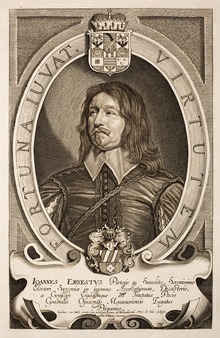Johann Ernst Pistoris
Johann Ernst Pistoris von Seusslitz and Hirschstein (* March 20, 1605 at Hirschstein Castle ; † May 13, 1680 in Seusslitz ) was a German chief judge and chief envoy in the negotiations for the Peace of Westphalia .
Live and act
The grandson of the privy councilor Hartmann Pistoris senior von Seusslitz and Hirschstein and the son of Hartmann Pistoris junior (1572–1622) and Katharina von Haugwitz (1578–1653) from the Kleeberg family studied law at the University of Leipzig after finishing school . During this time, due to the sudden death of his father, he became the sole owner of Seusslitz Castle in 1627 and also inherited the goods at Radeburg , Radewitz and Zunschwitz and others, which were transferred to him in 1629 as "whole hands" with his brother Hartmann .
In 1639 Pistoris was in the Saxon adopted civil service and 1,639 for Councilor promoted and in 1645 the Justice and Appellationsrat of Dresden called. After 1650 he was appointed President of the Court of Appeal and in 1655 he was appointed Chief Justice to Leipzig . In around 1660 he was last employed as governor of Pegau and Borna .
Johann Ernst Pistoris appeared several times as the envoy of Elector Johann Georg I of Saxony . He sent Pistoris together with Johann Leuber and 34 other delegates for the first time from 1646 to the preliminary negotiations for the Peace of Westphalia in Osnabrück and Münster . Here it was his main task to establish diplomatic contacts with the imperial estates of Kurmainz and Kurbrandenburg and with the ambassadors from France and Sweden, here especially with Johan Axelsson Oxenstierna , as well as the delegates of Emperor Ferdinand III. and to establish the Catholic imperial estates. At the conference venue in Osnabrück, Pistoris and Leuber also chaired the Electoral Saxony Corpus Evangelicorum , an institution of all Lutheran and Reformed imperial estates . However, due to a lack of financial support for these numerous consultations, Pistoris was ordered back by the elector in 1647.
In 1653, the elector appointed him as a principal envoy to the Reichstag in Regensburg , where a year later he was involved in the formulation of the Last Reichs Farewell. One last mission followed in the years 1655/56, Electorate in Pistoris on the Reichsdeputiertentag in Frankfurt represented.
In his little free time, Pistoris preferred to hunt, but also cultivated his passion for bibliophiles. During his student days he inherited the library of his great-grandfather, the Saxon Chancellor Simon Pistoris the Younger, and expanded it considerably. Johann Ernst Pistoris was buried in the family crypt in Seusslitz, to whose patronage church he had bequeathed a gold-plated communion vessel and a gold-plated wine jug after the peace treaty.
family
Johann Ernst Pistoris was married to Katharina von Köckeritz (1613–1666), daughter of the Appellate Council Hieronymus von Köckeritz and Benigna von Ende, with whom he had 13 children. His grandson Hartmann (* 1673), the last man in Seusslitz, moved to Styria , where he founded important hammer works in the Mürzzuschlag area , which have remained in the family for several generations. Due to successful entrepreneurship, his grandson Franz Xaver Pistoris (1734–1792) was given the Austrian nobility and the family subsequently called themselves Pistoris, Noble von Adelfeld.
Literature and Sources
- Pistoris, Johann Ernst. In: Johann Heinrich Zedler : Large complete universal lexicon of all sciences and arts . Volume 28, Leipzig 1741, column 534.
Web links
- Johann Ernst von Pistoris on the Internet portal "Westphalian History"
- Portrait of Johann Ernst von Pistoris
| personal data | |
|---|---|
| SURNAME | Pistoris, Johann Ernst |
| ALTERNATIVE NAMES | Pistoris, Hans Ernst von Hirschstein on Seusslitz |
| BRIEF DESCRIPTION | German chief judge and chief envoy in the negotiations for the Peace of Westphalia |
| DATE OF BIRTH | March 20, 1605 |
| PLACE OF BIRTH | Hirschstein Castle |
| DATE OF DEATH | May 13, 1680 |
| Place of death | Seusslitz |

